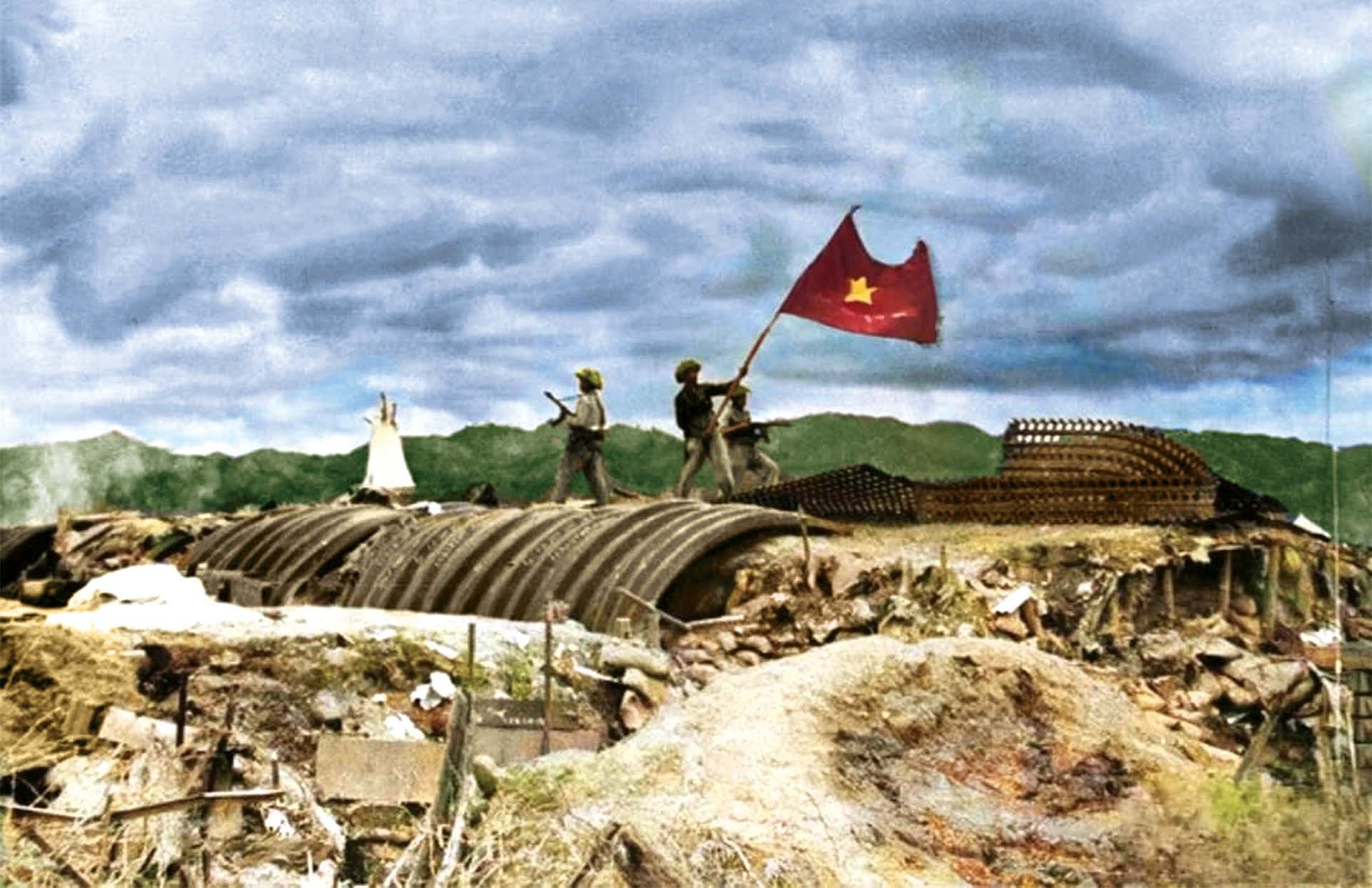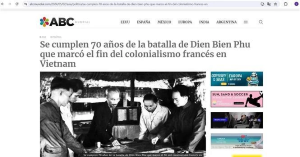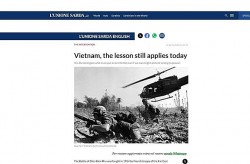
Dien Bien Phu Victory: Volition, bravery and intelligence of Viet Nam in Ho Chi Minh era
Latest
 |
| The flag “Determined to fight, Determined to win” on the roof of the General De Castries’ bunker on May 7, 1954. (Photo: VNA) |
The victory of Dien Bien Phu of the twentieth century “was recorded in the nation's history like a Bach Dang battle, a Chi Lang battle, or a Dong Da battle”, carving into the nation's history an immortal epic with shining heroic examples, affirming the volition, bravery and intelligence of Vietnamese in the Ho Chi Minh era and entering world history as a brilliant victory, breaking through the stronghold of the colonial slavery system of imperialism; to smash the old colonialism into pieces, to become a pioneering flag in the national liberation movement in Asia, Africa and Latin America.
The victory completely overturned the Navarre Plan, crushed the will of invasion of the French colonialists, forced them to sign the Geneva Agreement, ended the war, restored peace, and recognized the independence of the people of the three Indochina countries.
Pinnacle of Vietnamese bravery and intelligence
Entering the Autumn - Winter of 1953, the resistance war against the French colonialists took a new turn. Promoting the initiative, the Vietnamese army and people continuously attacked and counterattacked the enemy.
To reinforce the positions, the French colonialists aggressively implemented the Navarre Plan - a topmost effort, supported by the US, with enforcement of troops and increase of warfare expenditure, planning to destroy most of the Viet Minh's regular army within 18 months, to control the Vietnamese territory and pacify the Southern Indochina.
However, under the flexible and creative management of the Party, the Vietnamese army and people promoted their strategic offensive position, carrying out decisive attacks that soon bankrupted the Navarre plan. Thus, the French expeditionary force sent paratroopers to occupy Dien Bien Phu, strengthen the huge garrison, and build this barrack place into the strongest stronghold in Indochina, in order to attract and destroy the Vietnamese regular army.
| More from WVR |
 Argentine press spotlights significance of Dien Bien Phu Victory Argentine press spotlights significance of Dien Bien Phu Victory |
Faced with the hardship and fierceness of the battle, based on the analysis of battlefield realities, we determined that our strength was the strength of the people's war, of political and spiritual factors. In December 6, 1953, the Politburo decided to launch the Dien Bien Phu Campaign.
General and Commander-in-Chief Vo Nguyen Giap was appointed Commander and Secretary of the Campaign Party Committee. Dien Bien Phu battle field became a “historic rendezvous”, where both we and the French colonialists accepted a decisive strategic battle.
With the spirit of “All for the front line, all for victory”, the regular army units quickly gathered, day and night, to make paths through the forests, cut mountains, open roads, transport the heavy artillery, build battlefields, and get ready for the attack. Faced with the enemy's rock-hard defense ability, the Campaign Command and Party Committee decided to change the combat motto from “blitz, quickly resolve” to “fight decisively, advance decisively” and reported it to President Ho Chi Minh, the Politburo, to reach overall consensus.
This was the right decision, but many difficulties were encountered during the process. However, with a courageous spirit, challenging the hardships and sacrifices, the Vietnamese army and people were always proactive and creative in overcoming challenges and successfully accomplishing their tasks.
After 56 days and nights (from March 13 to May 7, 1954) of persistent fighting, the Vietnamese army and people completely destroyed the Dien Bien Phu stronghold. During the entire Campaign, we destroyed and captured 16,200 enemies, including 17 infantry and paratrooper battalions, three artillery battalions, mortar battalions, 10 auxiliary mercenary companies and sapper units, transport, tanks, and air force, etc.
The total number of enemy officers and corporals destroyed and captured was 1,766, including 1 major general, 16 colonels, lieutenant colonels, 353 officers from the rank of second lieutenant to major, 1,396 non-commissioned officers.
On May 11, 1954, the Party Central Committee sent a letter to party committees at all levels and all comrades participating in the Dien Bien Phu Campaign, clearly stating the factors leading to the victory. First of all, we “had the wise leadership of the Party Central Committee, the Government and President Ho Chi Minh; the General Military Commission and the General Command commanded resolutely, decisively and accurately.” General Commander-in-Chief Vo Nguyen Giap drew out a profound summary and stated clearly: “Under the leadership of the Party and Uncle Ho, after 9 years of resistance, our people achieved the great Victorious Battle of Dien Bien Phu.”
The Victorious Battle of Dien Bien Phu also originated from the passionate patriotic tradition and the strength of the great national unity forged through thousands of years. In particular, directly contributing to that victory were the great contributions and sacrifices of an army “coming from the people, fighting for the people” – it is the heroic Vietnam People's Army. The examples of heroic sacrifice on the battlefield are vivid proof of Viet Nam's revolutionary heroism and absolute loyalty to the Fatherland, the Party and the People.
That victory is comprehended as the result of the combination of national strength with the strength of the times, the immense assistance from China, the Soviet Union and other fraternal socialist countries as well as peace-loving people around the world, especially the solidarity fighting alliance of Viet Nam - Laos - Cambodia. But, above all, the Dien Bien Phu victory was the pinnacle of Vietnamese bravery and intelligence in the Ho Chi Minh era.
Resonating forever
For the Vietnamese people, the Dien Bien Phu victory is a continuation of the glorious tradition in the struggle for national liberation and defense of the Fatherland. President Ho Chi Minh affirmed: “The Victorious Battle of Dien Bien Phu gloriously ended the long, arduous and heroic resistance war of our people against the French colonial invasion and the intervention of the American imperialists.”
The Victorious Battle of Dien Bien Phu further illuminates the truth of Marxism-Leninism: “The imperialist war of aggression is bound to fail, the liberation revolution of the nations is bound to succeed.” Following the tradition and resounding Victorious Battle of Dien Bien Phu, the Vietnamese army and people continued to create victories of Van Tuong, Ap Bac, the General Offensive and Uprising of Tet Mau Than - 1968, the battle of “Dien Bien Phu in the air” in December 1972 and the Great Victory in Spring 1975, followed by a complete liberation of the South and national reunification of the country.
| More from WVR |
 Italian news website honours Dien Bien Phu Victory Italian news website honours Dien Bien Phu Victory |
Together in the trenches against a common enemy, the Dien Bien Phu Victory had a huge impact on the revolution of the peoples of Laos and Cambodia. Prince Suphanouvong, Prime Minister of the Lao Resistance Government, stated: “The Laotian people and army are extremely excited and confident in your victories, considering them as their own victories. The Dien Bien Phu victory has enormous influence and value on the common resistance war of the three countries Viet Nam – Cambodia - Laos and on the current movement to protect world peace. The Khmer delegate also said that the Dien Bien Phu victory “had a great impact on the Khmer battlefield.”
For the peace and national liberation movement in the world, the echoes of the Dien Bien Phu victory have great impact and influence, its resonance is the common pride of all progressive humanity, a shining example for the struggle for independence and freedom of Asian, African and Latin American countries.
William Foster, Chairman of the American Communist Party, assessed the great significance of the Dien Bien Phu victory: “The peoples of Asia and Africa have evidently realized the true meaning of this significant event at Dien Bien Phu. They were delighted and excited about the victories of the Vietnam People's Army and thought that it was an extremely great victory for the entire world's people over imperialism, especially the American imperialism.”
Thus, seven decades have passed, but the stance and meaning of the Dien Bien Phu Victory still resonates forever, as former President Tran Duc Luong affirmed in his statement: “Generations of Vietnamese people, the peoples who love peace, independence, and freedom around the world will forever admire and honor the Dien Bien Phu Victory.”

















